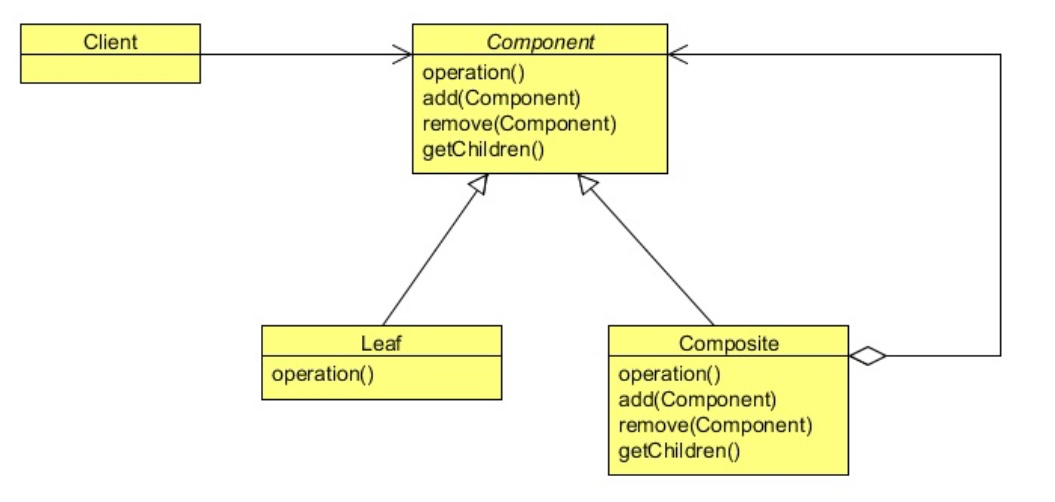设计模式-组合模式
2019-06-30 / 3 min read
定义
Compose objects into tree structures to represent part-whole hierarchies.Composite lets clients treat individual objects and compositions of objects uniformly.(将对象组合成树形结构以表示“部分-整体”的层次结构,使得用户对单个对象和组合对象的使用具有一致性。)
UML

代码实现
public abstract class Component {
//个体和整体都具有的共享
public void doSomething(){
//编写业务逻辑
}
}
public class Composite extends Component {
//构件容器
private ArrayList<Component> componentArrayList = new ArrayList<Component>();
//增加一个叶子构件或树枝构件
public void add(Component component){
this.componentArrayList.add(component);
}
//删除一个叶子构件或树枝构件
public void remove(Component component){
this.componentArrayList.remove(component);
}
//获得分支下的所有叶子构件和树枝构件
public ArrayList<Component> getChildren(){
return this.componentArrayList;
}
}
public class Leaf extends Component {
/*
* 可以覆写父类方法
* public void doSomething(){
*
* }
*/
}
public class Client {
public static void main(String[] args) {
//创建一个根节点
Composite root = new Composite();
root.doSomething();
//创建一个树枝构件
Composite branch = new Composite();
//创建一个叶子节点
Leaf leaf = new Leaf();
//建立整体
root.add(branch);
branch.add(leaf);
}
//通过递归遍历树
public static void display(Composite root){
for(Component c:root.getChildren()){
if(c instanceof Leaf){ //叶子节点
c.doSomething();
}else{ //树枝节点
display((Composite)c);
}
}
}
}
组合模式的优点
- 高层模块调用简单
一棵树形机构中的所有节点都是Component,局部和整体对调用者来说没有任何区别,也就是说,高层模块不必关心自己处理的是单个对象还是整个组合结构,简化了高层模块的代码。 - 节点自由增加
使用了组合模式后,我们可以看看,如果想增加一个树枝节点、树叶节点是不是都很容易,只要找到它的父节点就成,非常容易扩展,符合开闭原则,对以后的维护非常有利。
组合模式的缺点
组合模式有一个非常明显的缺点,看到我们在场景类中的定义,提到树叶和树枝使用时的定义了吗?直接使用了实现类!这在面向接口编程上是很不恰当的,与依赖倒置原则冲突,读者在使用的时候要考虑清楚,它限制了你接口的影响范围。
组合模式使用场景
- 想要表示对象间部分-整体的层次关系
- 想让客户端略过组合与个体的差异